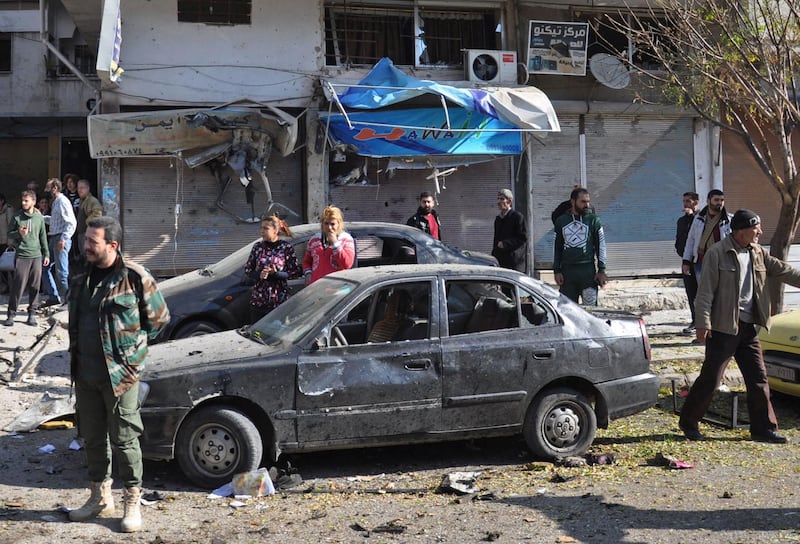Just over a week ago it was announced that the Syrian government would send a delegation to Geneva for what were to be the first peace talks sponsored by the United Nations in eight months. It was reported that Damascus had agreed to attend after Russia managed to get all parties to agree that the future of Syria's president would not be part of initial discussions.
"We are ready to negotiate directly with the other side," said a spokesman for the opposition coalition. By last Friday, however, Syria's chief negotiator, Bashar Al Jaafari, had quit. If the opposition would not withdraw a statement made in Riyadh in which their position was that there could be no role for Mr Al Assad in any interim government, said Mr Al Jaafari, "there will be no progress".
The vexed issue of Mr Al Assad’s future has been a stumbling block, that has prevented any progress towards working out a political solution to Syria’s civil war, for several years.
Of course, the Syrian opposition are not alone in their view. As long ago as 2012, the Arab League was calling for Mr Al Assad to step down and let his vice president assume office under a transition similar to that which had allowed the late Yemeni leader, Ali Abdullah Saleh, to agree to depart.
Many countries in the region have remained firm that negotiations can only proceed after Mr Al Assad has gone, and as The National reported on Monday, a leading American think-tank, the Atlantic Council, has just issued a report echoing this conclusion. Letting Mr Al Assad be part of a future settlement, it said, would "leave untouched the causes of Syria's instability and would reward those who have helped destroy the country and displace its population".
Why anyone should be unbending on this stance is more than understandable. Indeed, it could be easily cast as the only moral point of view. Close to half a million people have died in the civil war, and according to the UNHCR, an unbelievable 11 million people have been displaced – over six million internally, while five million have fled their country.
The toll in lives lost, livings destroyed, communities polarised and brutalised, children denied an education they will struggle to make up for as adults, and the regime’s cynical acquiescence in the rise of ISIL to divide and demoralise the legitimate opposition – all of these provide plenty of reasons to say that the proper place for Syria’s dictator is in the dock at the International Criminal Court in The Hague, not still ensconced in power until he can secure a safe future for himself in the country he has brought to ruin.
How could one disagree? Unfortunately, principle comes up hard against the reality that Mr Al Assad has never had any incentive to remove himself from the picture. In an interview with this newspaper, Tony Blair had it right when he said: "When Syria erupted in 2011, I argued strongly at the time that you should sit down with Assad and agree some process of transition. But if you are not going to do that and you are insisting that he goes, then go get him out."
A transition that Mr Al Assad could accept – ie one in which he is included – has never been offered, while the rest of the world has never made the kind of effort to “go get him out” that would have succeeded. After the disasters of intervention in Afghanistan and Iraq that is not surprising. But it still meant that calls for him to go were never backed up by the force necessary to persuade him that, actually, perhaps he’d had enough of Damascus and the attractions of exile in that comfortable dacha on the Black Sea were becoming ever clearer.
So by late 2017, Syria is in a situation whereby to say that Mr Al Assad has “won” may be debatable – plenty of respected figures do say so, although huge stretches of the country are not under his control; but it is perfectly clear that the opposition has in effect lost.
As the UN special envoy Staffan de Mistura put it in September: "For the opposition, the message is very clear: if they were planning to win the war, facts are proving that is not the case. So now it's time to win the peace."
But it is very difficult to see how they are going to do so while continuing to insist on Mr Al Assad’s departure. For he has never had less reason to agree.
It may be that Mr Al Jaafari’s exit from the Geneva negotiations was semi-staged; the opposition had said they were making no preconditions. But they have not changed their mind about Mr Al Jaafari’s boss. And what, given the support he has received from Russia and Iran, could persuade Mr Al Assad to change his?
Regular readers of this column will know that I have advocated for the inclusion of Mr Al Assad in talks from the beginning of the conflict: not because I have a shred of sympathy or liking for this mild-looking murderer, but because I could not see anyone managing to force him out – the only way he would go.
I realise that letting a man who has committed such atrocities against his own people stay would make many sick to their stomachs. But for talks to break down yet again over this issue makes me feel exactly the same. Yes, his remaining would be a high price for peace. But the likelihood is that more will die until it is eventually paid. For who will enforce any alternative?
Sholto Byrnes is a senior fellow at the Institute of Strategic and International Studies Malaysia





